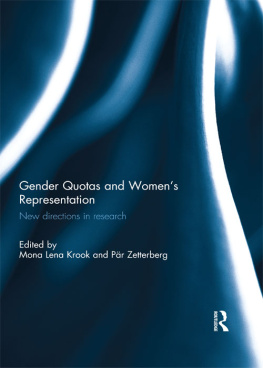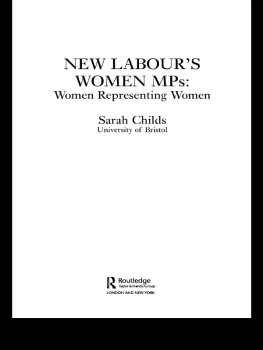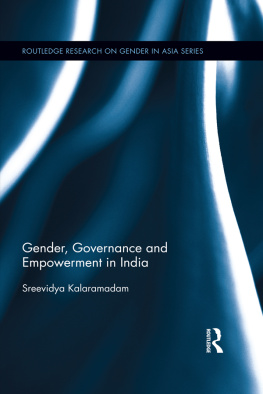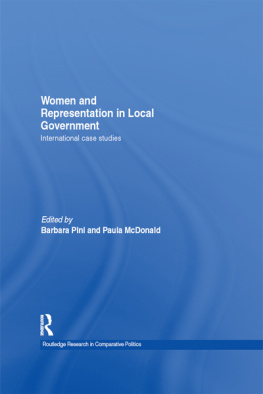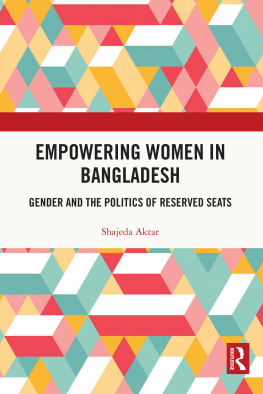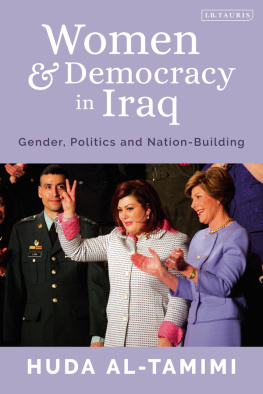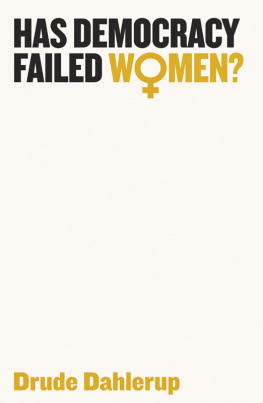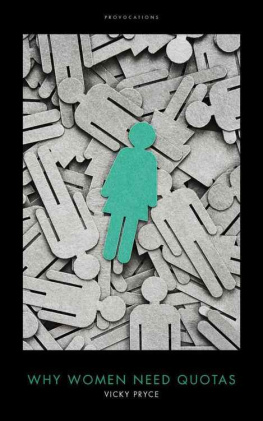Gender Quotas and Womens Representation
Electoral gender quotas have emerged as one of the most critical political reforms of the last two decades, having now been introduced in more than 130 countries worldwide. The recent and global nature of these developments has sparked both scholarly and popular interest in the design, origins, and effects of these policies.
This volume seeks to expand these existing agendas to forge new directions in research on gender quotas and political representation. The topics considered include new paths to adoption, as well asin the wake of quota introductionchanges in the dynamics of candidate selection, the status and role of women in legislative institutions, and the impact that women have on policy-making. Expanding the scope of quota studies, the contributions also address trends in different political parties and different levels of government, the effectiveness of quotas in democratic and non-democratic settings, and whether there might be non-quota mechanisms that could be pursued together with, or in lieu of, gender quotas in order to increase womens political representation.
This book was originally published as a special issue of Representation.
Mona Lena Krook is an Associate Professor of Political Science at Rutgers University, New Jersey, USA. She is the author of Quotas for Women in Politics: Gender and Candidate Selection Reform Worldwide (2009) and co-editor of The Impact of Gender Quotas (2012).
Pr Zetterberg is a Researcher in the Department of Government at Uppsala University, Sweden. His research focuses on political recruitment and political representation in comparative perspective, especially in Latin America, with a particular emphasis on the potential for gender quotas to remedy inequalities in politics.
Gender Quotas and Womens Representation
New directions in research
Edited by
Mona Lena Krook and Pr Zetterberg
First published 2016
by Routledge
2 Park Square, Milton Park, Abingdon, Oxon, OX14 4RN, UK
and by Routledge
711 Third Avenue, New York, NY 10017, USA
Routledge is an imprint of the Taylor & Francis Group, an informa business
2016 McDougall Trust
All rights reserved. No part of this book may be reprinted or reproduced or utilised in any form or by any electronic, mechanical, or other means, now known or hereafter invented, including photocopying and recording, or in any information storage or retrieval system, without permission in writing from the publishers.
Trademark notice: Product or corporate names may be trademarks or registered trademarks, and are used only for identification and explanation without intent to infringe.
British Library Cataloguing in Publication Data
A catalogue record for this book is available from the British Library
ISBN 13: 978-1-138-90742-3
Typeset in Frutiger
by RefineCatch Limited, Bungay, Suffolk
Publishers Note
The publisher accepts responsibility for any inconsistencies that may have arisen during the conversion of this book from journal articles to book chapters, namely the possible inclusion of journal terminology.
Disclaimer
Every effort has been made to contact copyright holders for their permission to reprint material in this book. The publishers would be grateful to hear from any copyright holder who is not here acknowledged and will undertake to rectify any errors or omissions in future editions of this book.
Contents
Mona Lena Krook and Pr Zetterberg
Kerryn Baker
Elin Bjarnegrd and Pr Zetterberg
Fernanda Vidal Correa
Audrey Vandeleene
Pablo Oate
Vibeke Wang
Amanda Clayton, Cecilia Josefsson and Vibeke Wang
Happy M. Kayuni and Ragnhild L. Muriaas
The chapters in this book were originally published in Representation, volume 50, issue 3 (September 2014). When citing this material, please use the original page numbering for each article, as follows:
Chapter 1
Introduction: Gender Quotas and Womens RepresentationNew Directions in Research
Mona Lena Krook and Pr Zetterberg
Representation, volume 50, issue 3 (September 2014) pp. 287294
Chapter 2
Quota Adoption and the Exogenous Track Model: The Parity Laws in the French Pacific Collectivities
Kerryn Baker
Representation, volume 50, issue 3 (September 2014) pp. 295306
Chapter 3
Why are Representational Guarantees Adopted for Women and Minorities? Comparing Constituency Formation and Electoral Quota Design within Countries
Elin Bjarnegrd and Pr Zetterberg
Representation, volume 50, issue 3 (September 2014) pp. 307320
Chapter 4
Federalism and Gender Quotas in Mexico: Analysing Propietario and Suplente Nominations
Fernanda Vidal Correa
Representation, volume 50, issue 3 (September 2014) pp. 321335
Chapter 5
Gender Quotas and Women-Friendly Candidate Selection: Evidence from Belgium
Audrey Vandeleene
Representation, volume 50, issue 3 (September 2014) pp. 337349
Chapter 6
The Effectiveness of Quotas: Vertical and Horizontal Discrimination in Spain
Pablo Oate
Representation, volume 50, issue 3 (September 2014) pp. 351364
Chapter 7
Tracing Gender Differences in Parliamentary Debates: A Growth Curve Analysis of Ugandan MPs Activity Levels in Plenary Sessions, 19982008
Vibeke Wang
Representation, volume 50, issue 3 (September 2014) pp. 365377
Chapter 8
Present without Presence? Gender, Quotas and Debate Recognition in the Ugandan Parliament
Amanda Clayton, Cecilia Josefsson and Vibeke Wang
Representation, volume 50, issue 3 (September 2014) pp. 379392
Chapter 9
Alternatives to Gender Quotas: Electoral Financing of Women Candidates in Malawi
Happy M. Kayuni and Ragnhild L. Muriaas
Representation, volume 50, issue 3 (September 2014) pp. 393404
For any permission-related enquiries please visit:
http://www.tandfonline.com/page/help/permissions
Kerryn Baker is a PhD scholar in the State Society and Governance in Melanesia Program at the Australian National University, Canberra, Australia.
Elin Bjarnegrd is an Assistant Professor in the Department of Government at Uppsala University, Sweden. Her research interests are within the field of comparative politics, with a particular focus on gender, masculinities, political recruitment, and peace and conflict. Her work has been published in journals such as International Interactions and Foreign Affairs, and her book entitled Gender, Informal Institutions and Political Recruitment was published in 2013.
Amanda Clayton is a PhD candidate in the Department of Political Science at the University of Washington, Seattle, Washington, USA. During the 2014/2015 academic year, she will be a Postdoctoral Fellow at the Free University of Berlin, Germany, as well as hold a Research Fellowship at the Women and Public Policy Program at Harvard Kennedy School, Cambridge, Massachusetts, USA.

